

Is it for me? Getting started. Starting a Business 1: Vision and Opportunity - University of Leeds. Starting a Business 2: People and Networks - University of Leeds. Starting a Business 3: Customers and Competitors - University of Leeds. Starting a Business 4: Business Processes - University of Leeds. This course is the fourth in a series of six about ‘starting a business’.
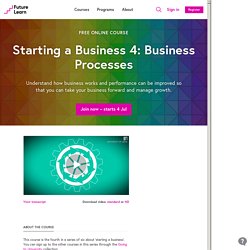
You can sign up to the other courses in this series through the Going to University collection. Starting a Business 5: Managing Finances - University of Leeds. This course is the fifth in a series of six about ‘starting a business’.
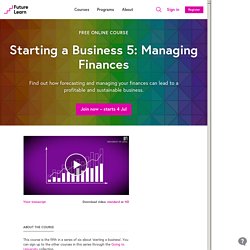
You can sign up to the other courses in this series through the Going to University collection. The management of finances is crucial to a successful business; financial information provides the evidence to support your decisions about a business and helps to justify those decisions when you present them to other people. Whether you have an idea for a venture in the future or you already have a side-line business whilst studying, this course will help you manage your finances and provide relevant and timely information. It will give you the time to plan, share your ideas with others and start to document your thoughts in a structured business plan. Note for students This course is part of a collection from the University of Leeds which have been specifically designed for those studying at school or college.
Starting a Business 6: Funding Your Business - University of Leeds. This is the final course in a series of six about ‘starting a business’.
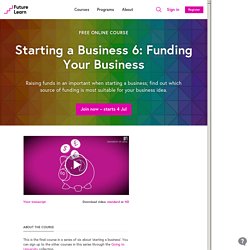
You can sign up to the other courses in this series through the Going to University collection. Leeds University Library /All Locations. Self-employment. How to become an entrepreneur when you graduate. How do you tell if entrepreneurship might be right for you, and how do you go about it?
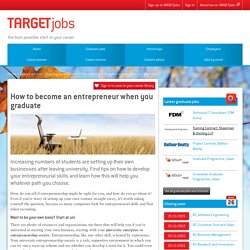
Even if you’re wary of setting up your own venture straight away, it’s worth asking yourself the question, because so many companies look for entrepreneurial skills and flair when recruiting. Want to be your own boss? Start at uni There are plenty of resources and organisations out there that will help you if you’re interested in starting your own business, starting with your university enterprise or entrepreneurship society. Entrepreneurship, like any other skill, is honed by experience. AGCAS self employment. CEP Entrepreneurship.
Be Your Own Boss. Jessica Murray: It’s time for graduates to shape the future of Leeds. The UK’s fastest growing city outside London, Leeds is evolving at a rapid pace.

As the home of so much innovation and creativity, it’s refreshing to see this increasingly coming from graduates of the multiple universities based here. Like many northern university cities, Leeds has long suffered from the ‘regional brain drain’; thousands of students come to Leeds to study and get a degree, before taking their highly sought after skills to London in search of work.
While this trend continues, graduates are starting to stay in their university city, and help shape its growth and development, whether that be by working for a local company or setting up their own enterprise. Take Jack Simpson, for example. He studied Philosophy and Politics at Leeds University, and has since gone on to found and run the Hyde Park Book Club, a café and venue space which has added some much needed creativity and rejuvenation to the area.
Leeds: The city of enterprise. Setting up. Princes Trust small business (1) About the toolkit - Business Survival Toolkit : Creative Choices. What’s in the toolkit?
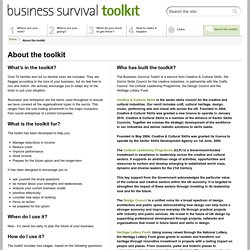
Over 70 familiar and not so familiar tools are included. They are flagged according to the size of your business, but do feel free to mix and match. We actively encourage you to adapt any of the tools to suit your situation. 'Business' and 'enterprise' are the terms used throughout to ensure we have covered all the organisational types in the sector. This ranges from the sole trading silversmith to the major museums, from social enterprises to Limited Companies. What is the toolkit for? The toolkit has been developed to help you: Manage reductions in income Reduce costs Improve performance Grow income Prepare for the future upturn and the longer-term It has been designed to encourage you to: ask yourself the brutal questions be honest about your strengths and weaknesses analyse your current business model prioritise effectively consider new ways of working focus on action be prepared for the upturn When do I use it?
How do I use it? Understandingfamilybusinessd7 hi res. Vitae WDRD career profiles Jun 09. Support for starting a business. Stage 1: Info session Our programme kicks off with a free information session in your local area.
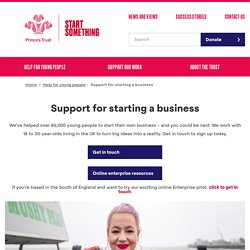
We'll tell you how we can support you and, if you're still keen, we'll also invite you onto our four-day interactive workshop. Stage 2: Workshop Over four days you'll get to meet like-minded people. StartUp Britain. How to Start a Business News & Topics. Whether you are starting an online business or a brick-and-mortar model, figuring out how to start a business, at its most basic, means finding a market need and then filling it.
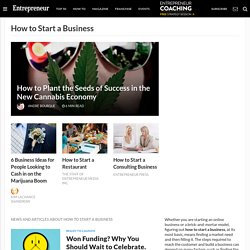
The steps required to reach the customer and build a business can depend on many factors, such as finding the appropriate marketplace, building an easy-to-use ecommerce website, establishing a good sales reputation and using search engine optimization to drive traffic to your site. Here are some of the very basics: Finance - SME Challengers. Free weekly news bulletin - Cobweb Information. Business and Industry. Top Business Advisers. Business Support IBD Business Advice Group. FSB, The Federation of Small Businesses. Home Page - ISBE. About INSME — INSME. The International Network for Small and Medium Sized Enterprises-INSME is a legally recognized not-for-profit Association open to international membership.
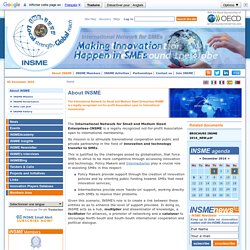
Its mission is to stimulate transnational cooperation and public and private partnership in the field of innovation and technology transfer to SMEs. This is justified by the challenges posed by globalisation, that force SMEs to strive to be more competitive through accessing innovation and technology. Policy Makers and Intermediaries play a crucial role in assisting SMEs in this respect: Policy Makers provide support through the creation of innovation policies and by orienting public funding towards SMEs that need innovation services;Intermediaries provide more ‘hands-on’ support, working directly with SMEs to resolve their problems.
Given this scenario, INSME’s role is to create a link between these entities so as to enhance the level of support provided. The INSME Association’s official working language is English. European Small Business Portal. The Online Register of Arts Consultants and Trainers. A network for young professionals. Join us and get active! Supporting and advising business. Yorkshire Business Insider Magazine. Entrepreneurship education, research and policy.
Business plan. Accommodation. Marketing and Selling. Government regulations. Intellectual property. Franchising. Raising finance. Finding an accountant. Managing finances. Women in Enterprise. Social enterprise. Freelancing/Working from home.